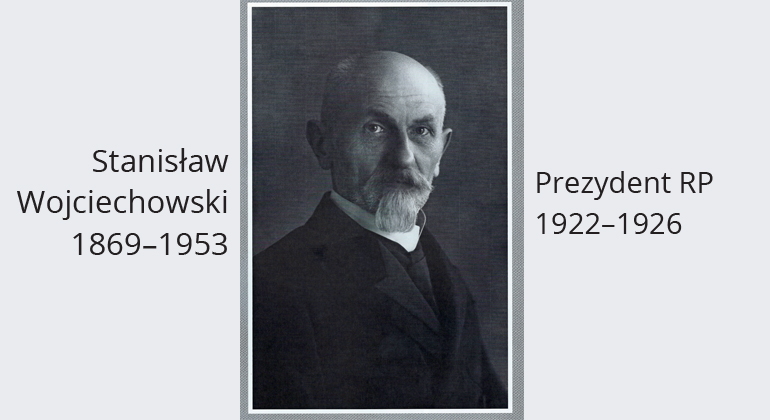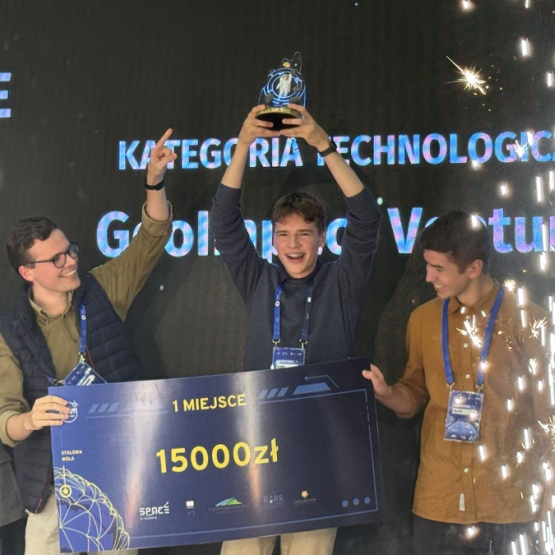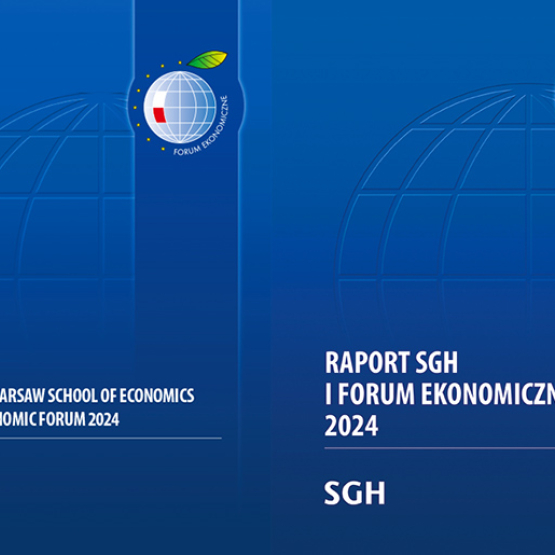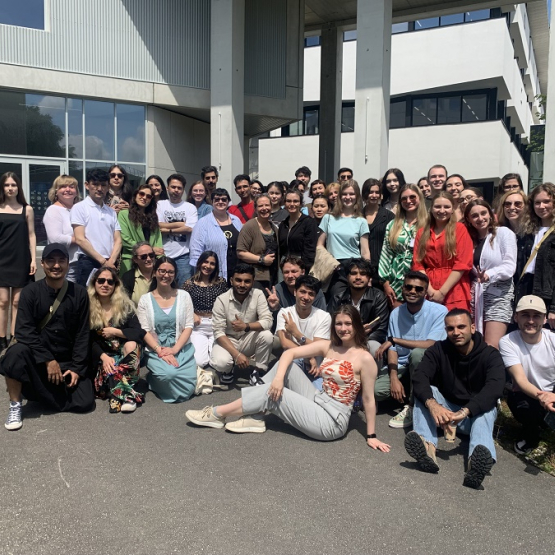
The inauguration of the 100th anniversary of taking office
The year 2022 marks one hundred years since the professor of the Higher School of Commerce in Warsaw (later renamed SGH Warsaw School of Economics) was elected President of the Republic of Poland – as the second head of state after Gabriel Narutowicz. Even though, in later years, many ministers and even prime ministers graduated from our university, only one person reached for the state’s highest office.
Stanisław Wojciechowski was born on 15 March 1869 in the town of Kalisz, in a family dating their nobility status back to the 15th century. He attended a secondary school (gymnasium) in Kalisz and in 1888 he enrolled at the University of Warsaw. At that time he became involved with Polish underground independence groups. He was arrested twice by the Russians and left Warsaw in 1892. He went to Zurich and then to Paris and London. After the creation of the International Union of Polish Socialists (Związek Zagraniczny Socjalistów Polskich), he became a member of its leadership (Centralizacja).
In 1893, he returned to Warsaw incognito to help the newly created Polish Socialist Party (PPS). This was a very active period in his life. He participated in party conventions, maintained contacts between various workers’ groups, printed underground papers, including the famous Robotnik, and delivered arms and printing machinery. At that time, the Polish PPS financed only two of its most important activists: Stanisław Wojciechowski and Józef Piłsudski. The two of them shared their involvement in managing party affairs for the next few years.
Tired of working in the underground, and persuaded by wife Maria, Wojciechowski withdrew from active party involvement at the beginning of the 20th century and settled in England in the colony of the Tolstoyan movement. He returned to Warsaw in 1906, taking advantage of the political amnesty. At that time, he lost direct contact with the PPS and Piłsudski, devoting himself to the activities of cooperatives, along with his other great friend, the philosopher Edward Abramowski. In this context, he founded, among other things, the Warsaw Union of Food Associations and a weekly magazine dedicated to this sphere, both of which he subsequently managed. Prompted by Stefan Żeromski, he called this magazine Społem (“Together”). Soon afterwards all Polish cooperatives started uniting under that name.
During the First World War, Stanisław Wojciechowski was in Russia. He worked there in the Polish National Committee (Komitet Narodowy Polski) and organized aid for refugees together with the future Prime Minister Władysław Grabski. He also took part in the creation of the Polish army in Russia. Under threat of arrest by the Bolsheviks, he returned to Poland in June 1918, and threw himself into politics. Following the renewal of contacts with Józef Piłsudski, in January 1919 he became Minister of Internal Affairs in the government of Ignacy Paderewski and then Leopold Skulski. During the formative years of Polish statehood, he co-organised, among other things, the state police, laid the foundations of local administration, and fought for the form of the future constitution. When Paderewski represented Poland at the Paris Conference, he became the de facto Deputy Prime Minister.
In the academic year 1919/1920, Wojciechowski became Professor at the Higher School of Commerce. He then took over the Chair of the Cooperative Movement. He lectured on the history and theory of cooperatives, and held seminars. At the initiative of the future President, the Student Association for Food Industry Cooperatives was also created.
He ran for the Senate in 1922 – but lost the election. In December 1922, PSL Piast put up his candidacy in the presidential election. Wojciechowski also lost this election, despite having received broad support from the National Assembly. After the assassination of President Gabriel Narutowicz, his candidature was again put forward and on 20 December 1922, Stanisław Wojciechowski was elected President of the Republic of Poland by the National Assembly with a large majority. He quickly managed to calm the public mood that threatened to explode after Narutowicz's death. The risk of bloody internal strife in Poland was eliminated.
After the election, Wojciechowski believed that he should meet the commitments he had already made to his students. For the next few weeks – already as an incumbent president – he came to the Higher School of Commerce to give lectures. Even in later years, Wojciechowski's links with SGH did not weaken.
Pursuant to an Act of Parliament, the private Higher School of Commerce was elevated to equal status with state academic schools on 13 February 1924. There are three signatures under this Act: of President Stanisław Wojciechowski, Prime Minister Władysław Grabski, and Minister for religions and public enlightenment, Bolesław Miklaszewski. The first two were former professors, the third of them was the School’s director on leave, and later its first Rector.
Wojciechowski held the office of President for three years and 145 days. Throughout almost the entire period, he was heavily involved in establishing the authority of the fledgling Polish state. When, on 12 May 1926, Józef Piłsudski launched a coup d'état, moving with the army towards Warsaw, Wojciechowski tried to stop him, using the respect due to the head of state. To no avail. On 14 May, in view of the considerable advantage of Piłsudski’s forces, the threat of civil war, and possible aggression by the country’s neighbours, Wojciechowski handed in a resignation from the position of President to the Speaker of the Parliament. That was his final farewell to being an active politician.
When in political retirement, Wojciechowski continued his activities in the “Społem” cooperative, and he returned to scientific and academic work, teaching at the Higher School of Commerce, renamed SGH in 1933, and the Warsaw University of Life Sciences (SGGW – the oldest agricultural and natural science university in Poland). At SGH he lectured on the history of the cooperative movement. The lecture was intended only for the cooperative programme of studies, but it was given mandatory status. According to demand among students, a seminar was also launched every now and again.
At the same time, Wojciechowski returned to work in the broader cooperative movement. He served as director of the Cooperative Research Institute between 1928 and 1929 and later held a position in the Institute’s Research Council. He wrote a number of articles and studies, focusing primarily on issues concerning cooperatives.
The second Polish President survived German occupation in his home, from where the Germans displaced him during the Warsaw Uprising. He then went to the Dulag 121 transitional camp in Pruszków. He died almost entirely forgotten on 9 April 1953 in Gołąbki near Warsaw. He was buried in the family grave at the Powązki Cemetery in Warsaw.
“For me, every visit to the university, a visit to an auditorium where we have distinguished guests, professors and students, is a source of great emotion. Higher education establishments are a unique place, and the SGH Warsaw School of Economics, where my great-grandfather worked literally from its inception and which, as a school, refers to values important to the university itself, to the students, to the staff, and which is extremely important also because it adheres to the same values my great-grandfather considered most important in his life. So I was very excited when we heard about these values today, and I am glad that we are continuing along these lines. Generations change, new people come in, but values and principles remain the same.
My great-grandfather was a very modest person. He believed that action, work for others, scientific work and training were the important things. He attached importance to small but essential things, and all other and less important issues were treated by him just as an unnecessary addition. He valued working with people and for people. He was always like that, whether he was at the university, in public office, working in “Społem” or in his family circle. Modesty above all else! This was Stanisław Wojciechowski.” says Małgorzata Maria Kidawa-Błońska, Speaker of the Parliament.
References
Publications by the President:
• Stanisław Wojciechowski, Moje wspomnienia, vol. I-II, edited by Jerzy Łazor, Muzeum Historii Polski, Warszawa 2017.
• Stanisław Wojciechowski, Wspomnienia, orędzia, artykuły, articles, edited by M. Groń-Drozdowska, M. M. Drozdowski, Bellona, Warszawa 1995.
• Stanisław Wojciechowski, Wybór pism spółdzielczych, edited by Kamil Piskała, Oficyna Naukowa, Warszawa 2020.
Bibliography:
• Zygmunt Kaczmarek, Trzej prezydenci II Rzeczypospolitej, Instytut Wydawniczy Związków Zawodowych, Warszawa 1988, pp. 66–174.
• Aleksandra Kosicka, Gabinet Paderewskiego, 16 I 1919–9 XII 1919, [in:] Janusz Faryś, Janusz Pajewski, Gabinety Drugiej Rzeczypospolitej, Likon, Poznań 1991, pp. 41–53.
• Ludwik Malinowski, Politycy Drugiej Rzeczypospolitej 1918–1939 (służba i życie prywatne), vol. I, Adam Marszałek Toruń 1995, pp. 183–201.
• Zdzisław Pawluczuk, Konspirator i prezydent. Rzecz o Stanisławie Wojciechowskim, Globus, Lublin 1993.
• Adam Wątor, Gabinet Leopolda Skulskiego, 13 XII 1919– 9 VI 1920, [in:] Janusz Faryś, Janusz Pajewski, Gabinety Drugiej Rzeczypospolitej, Likon, Poznań 1991, pp. 55–61.
• Piotr Wróbel, Stanisław Wojciechowski, prezydent Rzeczypospolitej 20 XII 1922–14 V 1926, [in:] Prezydenci i premierzy Drugiej Rzeczypospolitej, edited by Andrzej Chojnowski, Piotr Wróbel, Ossolineum, Wrocław–Warszawa–Kraków 1992.
President Stanisław Wojciechowski, 1926, photo by Narcyz Witczak-Witaczyński



